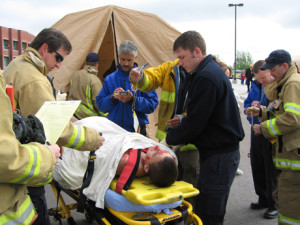 Training for a career in the public health field can allow students to make a positive difference in the lives of others.
Training for a career in the public health field can allow students to make a positive difference in the lives of others.
Public health employees work at the local, state and federal levels to combat disease and to promote better health among all members of society. From research and epidemiology positions at the Centers for Disease Control and Prevention to public health nurses operating at the county level, public health professionals provide the services needed to keep Americans healthier and safer.
Here are five emerging career paths in the field of public health.
Biostatisticians
A relatively new arrival in the public health arena, the biostatistician performs statistical analysis on research data to identify trends and to establish links between certain behaviors and medical outcomes. The U.S. Bureau of Labor Statistics (BLS) listed biostatistician as one of its hottest new healthcare careers for 2008. Employment opportunities in this field are expected to grow by more than 25 percent between 2012 and 2022. Most statistician jobs require a master’s degree at a minimum; a doctorate is required for some advanced positions. The federal government is one of the primary employers for statisticians and biostatisticians. Median pay for these government jobs was $97,250 as of May 2012.
Advanced Practice Registered Nurses
Nurse midwives, nurse anesthetists and nurse practitioners are all categorized as advanced practice registered nurses (APRNs) thanks to their advanced training in the nursing field. As physician shortages continue in many areas, APRNs will increasingly take up the slack by performing duties once reserved only for doctors. As a result, demand for APRNs is expected to increase significantly in the next few years. Nurse practitioners will be in especially high demand in the public health field. Their generalized training in the medical profession will allow them to offer near-comprehensive services for their patients, including prescribing medicines and performing regular check-ups. APRNs must have an accredited master’s degree and must be licensed as a registered nurse to practice in the public health field.
Medical Microbiologists
Microbiology is the study of microscopic organisms to include viruses, bacteria, fungi and certain parasites. Medical microbiologists perform research to create better defenses against the spread of infection and to identify risks to public health and safety. In some cases, bacterial cultures can be used to create new pharmaceutical treatments or as test beds for observing the effects of other microbes in the laboratory environment. Medical microbiologists must complete a bachelor’s degree program for most entry-level jobs. A master’s degree or Ph.D. may be required for upper-level research positions.
Most public health microbiologists perform their duties on behalf of the federal government and earn median annual wages of $96,520 as of May 2012; the overall median wage for medical microbiologists is $66,260.
Speech-Language Pathologists
Most speech therapists are employed in public schools and provide help for students with communication disorders caused by injuries, congenital defects, medical conditions, developmental delays or emotional issues. According to the American Speech-Language-Hearing Association, speech pathologists work to treat, prevent and assess swallowing, speaking and social communication difficulties in patients of all ages. Some therapists work in medical facilities or as part of a public health team to address the needs of adults in a specific community or facility. A master’s degree from an accredited program is required to work as a speech pathologist; most states also require that these public health professionals be licensed.
Emergency Management Directors
Also known as preparedness specialists, emergency management directors work proactively to ensure that federal agencies and private corporations are ready for natural disasters, terrorist attacks and other public health and safety issues. Job duties typically include advanced planning for possible scenarios that could affect facilities, utilities and public services. In the event of an emergency, these professionals will also deploy personnel and organize the response to provide members of the public with basic supplies and assistance during these crisis situations. In some cases, emergency management directors may also be responsible for maintaining an online presence and communications centers to ensure the most effective responses to these situations. A bachelor’s degree in a related field is required for most entry-level emergency management positions.
Demand for qualified professionals in the health care industry continues to rise. By considering one of these up-and-coming public health careers, students can achieve success in their chosen field while giving back to their communities at the same time.